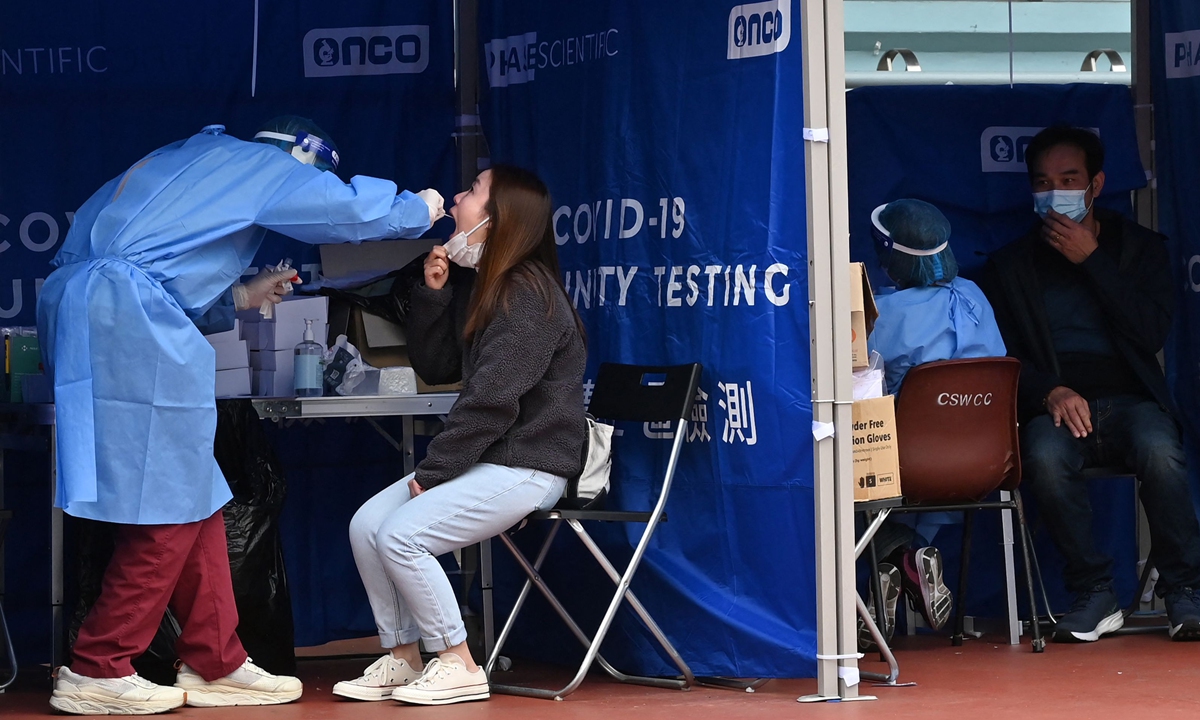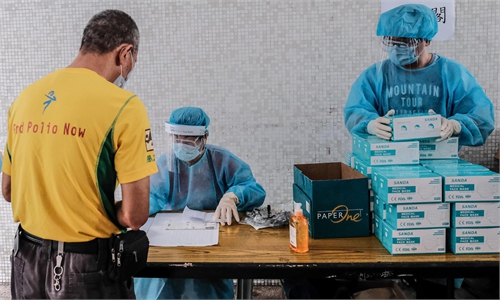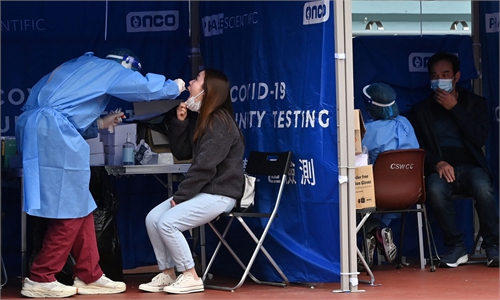Fresh COVID surge engulfs HK's medical system
'Dynamic zero' strategy still key to fighting epidemic onslaught

A woman is tested at a mobile specimen collection station for COVID-19 in Hong Kong's Prince Edward district on February 8, 2022, as authorities scrambled to ramp up testing capacity following a record high of new infections. Photo: VCG
Hong Kong sounded the alarm with another 986 COVID-19 infections registered on Thursday, after the city reported a four-digit daily tally on Wednesday for the first time, which threatens to engulf the city's medical system.
The Hong Kong and Macao Affairs Office of the State Council spokesperson said on Thursday that the National Health Commission and the Chinese CDC, along with anti-epidemic experts from Hong Kong, Guangdong Province and Shenzhen, will hold a meeting in Shenzhen soon to study the anti-epidemic measures to support Hong Kong.
The central government will continue supporting the HKSAR government's zero-tolerance target and policy, firmly support the city in difficult times, and provide the help the city needs, the spokesperson said.
Besides the 986 confirmed cases, about 800 preliminary positive cases were also recorded on Thursday.
More infections have emerged from elderly homes. An unvaccinated 94-year-old patient with a chronic disease passed away on Thursday, said Larry Lee, a chief manager with the city' Hospital Authority. Lee said on Wednesday that two male patients aged 73 and 76, respectively, with chronic illnesses died.
Media reports said 23 medical staff were among those reported infections on Thursday.
On Wednesday, 1,161 people were tested positive for COVID-19, marking the first time the daily tally of Hong Kong epidemic has gone into four digits.
Hong Kong media said so far about 1,400 cases had shown no clear viral transmissions, indicating there were 1,400 potential transmission chains in the city.
Experts and lawmakers said that the possibility for the Hong Kong Special Administrative Region (HKSAR) to seek support from the central government cannot be ruled out if the city's testing capacity falls short and medical resources are overwhelmed.
Hong Kong has beefed up social restrictions on Tuesday, limiting the number of social gatherings to two people and issuing closure orders to public venues such as hair solons and religious buildings.
Ben Chan Han-pan, a member of Hong Kong Legislative Council, told the Global Times the outbreak has triggered long lines of testing across the city with some testing points seeing some 5,000 people in line, and quarantine facilities were packed. Those who cannot receive quarantine in time could cause further community spread.
Factors such as family reunions in the Chinese Lunar New Year and the prevalence of Omicron lead to the severity of the outbreak, Ben said.
Quarantine and medical treatment facilities were filled to capacity and it is practical to place COVID-19 case with mild symptoms under home quarantine, Yuen Kwok-yung from the University of Hong Kong, who is also a government advisor, told Hong Kong media Thursday.
Yuen believes epidemic infections will see a downward trend when the latest social distancing measures are implemented by residents.
But researchers from the University of Hong Kong said the city should consider a full lockdown or risk seeing nearly 1,000 deaths by mid-June. Their modeling also predicted that the outbreak will peak in mid-to-late March with 28,000 infections and 468 hospitalizations a day, local media outlet The Standard reported.
On whether Hong Kong should stick to a dynamic zero-case strategy or living with the virus, Ben told the Global Times the city doesn't qualify to live with the virus because Hong Kong needs to seek a border reopening with the mainland as soon as possible to boost its economy. "We only have one way, that's zero-case strategy. We haven't changed that and will not change it."
But it is difficult for Hong Kong to have strict lockdowns to cut off transmissions, unlike in the mainland, Ben said.
Hong Kong is no longer able to deal with the current tsunami-like outbreak, Ben said. The hospitals and quarantine points in Hong Kong are already saturated, so the most effective way now is to ask for help from the central government. If we can get support from the mainland, everyone will feel relieved, Ben said.
A letter by the Democratic Alliance for the Betterment and Progress of Hong Kong to Carrie Lam, the chief executive of the HKSAR obtained by the Global Times suggested the central government assist the city to build more "Fire Eye labs" and dispatch more testing teams to boost testing capability to screen out transmission chains and cut off community spread.
The alliance said the SAR government should seek help from the central government to build more temporary quarantine facilities and, if necessary, offer medical support to help the city go through the difficult time.
Zeng Guang, a senior expert with China's CDC, who holds a positive attitude toward the epidemic development in Hong Kong, told the Global Times on Thursday that the epidemic is not out of control, believing Hong Kong possesses abundant resources that are undiscovered to be utilized. Still, if the SAR government seeks help, the central government will immediately act, Zeng noted.




